UN nuclear chief says Israeli strike may push Iran toward the bomb
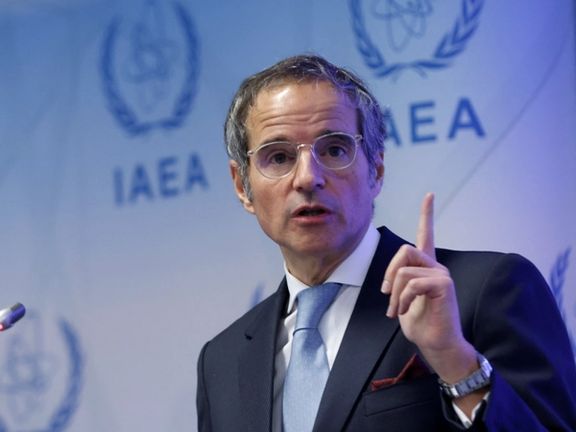
An Israeli strike on Iranian nuclear sites may push Tehran toward pursuing a bomb, International Atomic Energy Agency (IAEA) chief Rafael Grossi told Israeli news channel i24News.

An Israeli strike on Iranian nuclear sites may push Tehran toward pursuing a bomb, International Atomic Energy Agency (IAEA) chief Rafael Grossi told Israeli news channel i24News.
Such an attack "might have an amalgamating effect which would make a determination on the part of Iran to go to a nuclear weapon or to abandon the treaty on non-proliferation. I’m telling you this because they have told me,” Grossi said.
The IAEA chief emphasized the difficulty any military operation would have of destroying Iran's nuclear capabilities.
“Certainly this program runs wide and deep. And when I say deep, I know what I’m saying. So many of these facilities are extremely well protected. This would require a very, very devastating force to affect it.”
The United States and Iran are locked in high-stakes negotiations over Tehran's nuclear program, and US President Donald Trump has mooted an attack if they fail.
Israel struck multiple targets inside Iran in October and has repeatedly vowed to deny Iran a nuclear weapon, which it views as an existential threat.
Tehran denies seeking nuclear weapons but its arch-nemesis Israel and Western countries doubt its intentions.
Grossi said Iran needed to the let the nuclear watchdog do its job by allowing more inspection and explaining past behavior.
"I am in a constant dialog, especially with the foreign minister (Abbas) Araghchi," Grossi said. "(They say) they have nothing happened. If this is the case, then they should allow us to do our job and to get as much access as we can."
Western powers may push for a resolution finding Tehran non-compliant with its nuclear non-proliferation obligations at the upcoming quarterly meeting of the IAEA Board of Governors this week.
Iran has warned of an unspecified strong response to any such move and has accused the IAEA of being swayed by its Western adversaries.
The United States accused Iran of seeking a nuclear weapon as part of the shadowy Amad Project scrapped in 2004, an effort Washington says was overseen by Iran’s Organization of Defensive Innovation and Research.
"There are areas of real concern and we need to get to the bottom of a number of things," Grossi said, without referring to any specific issues.
"Over the past few years ... we discovered traces of enriched uranium in places that were not supposed to be having any nuclear activity. So my question here - this is not an accusation - It's just a very logical question: if we found these traces there, what was going on?"
The IAEA would likely play a central role in verifying and overseeing any nuclear agreement between Iran and the United States, as it did with an international deal US President Donald Trump scrapped in 2018.
Hawks in Israel and the United States have said Iran's lack of full disclosure on past activities calls into question its commitment to any future deal.
"For years ... we have been getting some answers, and these answers have not been satisfactory," Grossi added. "Please do not believe that we are naive."

Iran’s Supreme National Security Council issued a warning on Monday that any Israeli attack on Iranian nuclear facilities will be met with a direct response targeting Israel’s concealed nuclear infrastructure.
Iran’s state broadcaster IRIB reported on Saturday that Iranian intelligence services had obtained a large cache of sensitive material from Israel, including documents related to the Jewish state's nuclear and strategic facilities.
The intelligence operation yielded a “significant intelligence achievement,” the Supreme National Security Council's said in a statement, adding that a detailed database of Israeli targets is now at the disposal of Iran’s armed forces.
“In the event of aggression, the (Israeli) regime’s hidden nuclear facilities will be targeted,” the statement said.
The council emphasized that this intelligence gain was part of “a smart, quiet strategy” by the Islamic Republic in response to what it described as hostile media and political pressure.
It further praised what it described as "the tireless and unassuming efforts of the armed forces aimed at building operational capabilities tailored to the weaknesses and strengths of the Zionist occupying regime (Israel) and its supporters."
Iran's intelligence and operational readiness, the statement added, now allows Iran’s forces to immediately retaliate not only against nuclear threats but also against any act of sabotage targeting Iran’s economic or military infrastructure.
Iran’s intelligence minister said on Sunday the documents will soon be made public. However, Israeli security experts have cast doubt on Tehran’s claims of obtaining sensitive Israeli intelligence as exaggerated or psychological warfare.
Asher Ben-Artzi, a former head of Israel’s Interpol, told Iran International, “I know that the relevant information is well-guarded in Israel and it does not seem to me that hackers can access it."
He warned that the intelligence may not be as significant as claimed. “Iran wants to tell the world that their intelligence personnel are professionals, but they probably think that their use of disinformation will increase their achievements,” he said.
In 2018, Israel said it had stolen Iran's nuclear documents including 55,000 pages and 55,000 digital files from a warehouse in Tehran's Shourabad area through an intelligence operation.
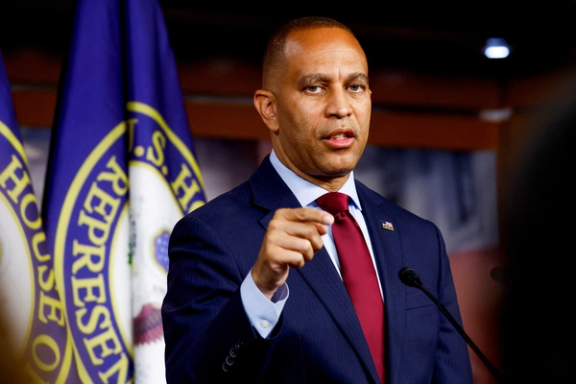
Democratic lawmakers on the sidelines of the Trump administration's high-stakes nuclear talks with Iran largely hope for their success but lament being cut out of a process playing out behind closed doors.
While hawkish Republicans and a lone Democratic Senator John Fetterman have vocally questioned Iran's nuclear intentions as Trump has pushed for harsher terms, mainstream members of the caucus have mostly kept mum.
Trump in 2018 exited an international deal inked under Democratic President Barack Obama, much to the party's consternation, but its leadership has signaled cautious backing for a new stronger deal.
House Minority Leader Hakeem Jeffries last week blessed the diplomatic effort but questioned why Congress was not being briefed.
"With respect, we don't have a great deal of visibility into what President Trump is trying to accomplish in terms of the current negotiations with Iran," the New York representative said.
"Iran should never be allowed to become nuclear capable, and ... (a deal) should be longer and stronger than what had previously existed, and should be done in a manner that is verifiable and resilient."
Jeffries told Iran International "that a future agreement must be stronger than its predecessor—enforceable in a lasting way, with real consequences for violations.”
The crux of the dispute in talks appears to center around enrichment. While Obama's deal allowed limited uranium enrichment on Iranian soil, a toughened line by Trump's negotiators demands a total halt - a scenario Tehran has repeatedly rejected.
Senator Chris Murphy, a Connecticut Democrat who sits on the Senate Foreign Relations Committee, was more critical of the administration's handling of the key foreign policy issue.
"As far as I know the administration has provided zero briefing to this committee on the negotiations, so they seem to be happening totally in secret," Murphy told Iran International.
"I think that's pretty dangerous for the American people to be kept in the dark about these negotiations, especially really sensitive negotiations that involve a potential nuclear war," he added.
Democrat maverick
Republicans, by contrast, who appear to have no more formal briefing than their counterparts across the aisle have consistently expressed in news interviews and social media posts a reticence to trust Iran in a new agreement.
Perhaps the harshest line on Iran has been taken not by Republican but by Democratic Senator John Fetterman of Pennsylvania, a strident advocate of Israel who suggested on X last week that Washington should bomb its way out of the Iran impasse.
His remarks hinted that Iran's highly enriched uranium stockpile should be hit with a US bunker-buster bomb.
While bellicose Republican rhetoric toward Iran is familiar territory, a sitting Democrat openly advocating for preemptive military action is almost unprecedented in the post-Iraq invasion era.
According to an aide close to Fetterman who spoke to Iran International on condition of anonymity, he views Iran’s nuclear program as a “ticking time bomb.”
Fetterman, the aide added, believes any delay in confronting Iran militarily could leave both the United States and Israel with fewer and riskier options in the future.
An Israeli preemptive strike would be a “once-in-a-generation opportunity” to, in his words, “obliterate” the Islamic Republic’s nuclear ambitions.
The emergence of Fetterman’s hawkish line has intensified long-standing tensions within Democratic ranks over the use of military power and America’s strategic posture in the Middle East.
For Democrats, Fetterman’s rhetoric adds a new layer of complexity as the party seeks to re-establish a distinct foreign policy identity in opposition.
While they seek to articulate a position that contrasts meaningfully with the Trump administration, avoiding internal fragmentation or policy incoherence will be key.
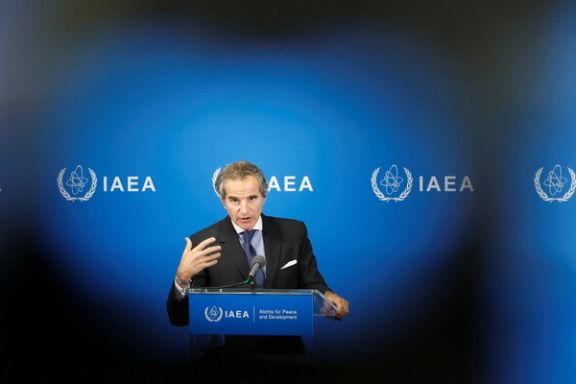
The head of the UN nuclear watchdog said on Monday that a draft resolution put forward by Western powers censuring Iran for its nuclear non-compliance is separate from the indirect talks between Tehran and Washington.
“There is no formal link between one thing and the other,” said Rafael Grossi, Director General of the International Atomic Energy Agency (IAEA), at a press conference after the agency’s Board of Governors opening meeting in Vienna.
“But it is obvious, I think for all of us, that there is an interrelation and perhaps a mutual influence. Not perhaps—for sure. It is a mutual influence.”
Grossi emphasized that the draft resolution—tabled by the United States, France, Germany, and the United Kingdom—should be viewed as part of the agency’s technical oversight role, not as a political manoeuvre aimed at pressuring Iran as Tehran alleges.
Earlier in the day, Mohammad Eslami, head of the Atomic Energy Organization of Iran (AEOI), accused the IAEA of acting under American influence and said the agency had lost its credibility.“We have no hidden program and no deviation from our obligations.”
AEOI spokesman Behrouz Kamalvandi also warned of specific countermeasures. “Last time we warned them and they didn’t listen, so we increased 60 percent enrichment sevenfold. Now again, we’ve told them what actions we may take,” he said in a broadcast. “The agency shouldn’t expect continued constructive cooperation.”
Iran views the potential censure resolution at the IAEA Board of Governors as a politically motivated step that could be exploited by the E3 to push for a Security Council move triggering the snapback mechanism, which would reimpose UN sanctions lifted under the 2015 nuclear accord.
JCPOA no longer sufficient as Iran advances program, IAEA chief says
Grossi said that even if revived, the 2015 deal—formally known as the Joint Comprehensive Plan of Action (JCPOA)—would no longer be enough to address the scale and complexity of Iran’s nuclear activities.
“The JCPOA was designed to be applied to a very specific type of Iran program, which is completely different now,” he said. “Even if you wanted to revive it, it would not be enough because now they have new technologies.”
He added that the agency’s technical work must continue regardless of the political track. “We cannot wait for negotiations. We are an independent technical body. But if diplomacy succeeds, it will help reinforce cooperation.”
Highly enriched uranium ‘cannot be ignored’
Grossi stressed that while uranium enrichment is not prohibited under international law, the levels Iran is reaching are a serious concern.
“Uranium enrichment per se is not a forbidden activity, which is something my Iranian counterparts always tell me,” he said.
“At the same time, when you accumulate and continue to accumulate, and you are the only country in the world doing this at a level very, very close to what is needed for a nuclear explosive device, then we cannot ignore it.”
“There is no medical or civilian use for it,” he said. “That is why it is important for us.”
Iran obtaining IAEA documents undermines cooperation, Grossi says
Iran’s possession and analysis of confidential documents from the agency is a “bad” development that undermines the cooperative relationship expected between Tehran and the IAEA, Grossi said without elaborating on the documents.
A confidential IAEA report dated May 31 said that the agency had obtained “conclusive evidence of highly confidential documents belonging to the Agency having been actively collected and analyzed by Iran.”
“This dates to a few years ago, but we could determine with all clarity that documents that belong to the agency were in the hands of Iranian authorities, which is bad,” Grossi told reporters. “We believe that an action like this is not compatible with the spirit of cooperation.”
IAEA working to calm threat of Israeli military action
In response to a question about the possibility of Israeli military action on Iran’s nuclear program, Grossi said the agency is actively seeking to de-escalate the situation.
“We are trying to solve this without the use of violence or force,” he said. “If it’s done correctly, thoroughly, with a very strong verification and monitoring chapter from us, it would give the necessary assurance for Israel and for the world that there is nothing to be feared coming from there.”
Grossi said Israeli concerns were not new, but said the IAEA's focus remains technical. “We are trying to get to a solution in a diplomatic way, trying to clarify and solve this.”
No communication on Iran’s claim of seized Israeli documents
Responding to a question about reports that Iran has obtained sensitive data on Israeli nuclear activities, Grossi said the agency had received no official communication regarding the claims.
Grossi added that "This seems to refer to Soreq [nuclear center] which is research facility which we inspect by the way,” —suggesting that the documents Iran says to have accessed may relate to this site.
Contrary to popular belief, Grossi emphasized that the IAEA does inspect certain parts of Israel’s nuclear program.
“Normally people tell me, ‘you don’t inspect Israel.’ Yes, we do... We don’t inspect other strategic parts of the program, but we do inspect Soreq,” he said.
Iran’s state broadcaster IRIB reported on Saturday that Iranian intelligence services had obtained a significant volume of classified material from Israel, including documents concerning the country’s nuclear and strategic infrastructure.
Israeli security analysts have dismissed the claims as exaggerated or psychological warfare, while Iran’s intelligence minister said that the documents would soon be made public.
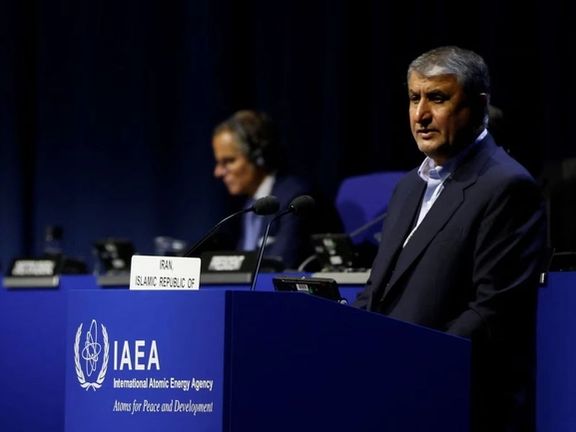
Iran has warned it will take retaliatory steps if the International Atomic Energy Agency (IAEA) proceeds with a resolution censuring its nuclear activities, following the publication of a detailed report alleging undeclared nuclear work across multiple covert sites.
Mohammad Eslami, head of the Atomic Energy Organization of Iran, said the agency had “lost its credibility” by acting under “unilateral American influence.”
“We have no hidden program and no deviation from our obligations,” Eslami said in an interview with Al-Arabi TV of Qatar ahead of the IAEA Board of Governors meeting this week. “We will not endanger the health of our people by surrendering to political pressure.”
Behrouz Kamalvandi, spokesperson for the agency, also said in a separate broadcast that Iran had already conveyed a list of possible countermeasures if censured.
“Last time we warned them and they didn’t listen, so we increased 60 percent enrichment sevenfold. Now again, we’ve told them what actions we may take. The agency shouldn’t expect continued constructive cooperation.”
ISIS analysis: IAEA findings show coordinated nuclear program
In an analysis of the IAEA’s May 31 report, the Institute for Science and International Security (ISIS) said the agency had presented “new details from its assessments about Iran’s activities involving undeclared nuclear materials, related equipment, as well as their nuclear weapons relevance, at four sites in Iran.”
The analysis said the IAEA now concludes that Lavizan-Shian, Marivan, Varamin, and Turquz-Abad were “part of an undeclared structured nuclear program.”
The ISIS report highlights Iran’s production of uranium deuteride (UD3) neutron initiators at Lavizan-Shian during 2003, saying these were “integrated into scaled implosion systems and explosively tested.” These initiators play a central role in triggering the chain reaction in a nuclear weapon.
At Marivan, the IAEA assessed that Iran conducted four explosive tests involving “full-scale hemispherical implosion systems,” consistent with preparation for a cold test of a nuclear weapon device.
The analysis said the IAEA found indications that “equipment was developed and tested at Lavizan-Shian that included neutron detectors and housings,” and that “identical housing for neutron detectors was deployed in an explosive test at Marivan.”
The Varamin site, also referred to as the Tehran Plant in Iran’s nuclear archive, was identified as a pilot-scale uranium conversion facility. According to the analysis, the IAEA reported that the site housed “small but heavily contaminated (and possibly full) UF6 cylinders,” along with fluorine-based chemicals and radiation monitoring equipment.
Five containers of equipment were deemed essential by Iranian operators and were later moved to Turquz-Abad.
The ISIS review emphasized the connection between these sites and Turquz-Abad, which the IAEA concluded served as a storage site for nuclear materials and contaminated equipment from Lavizan-Shian, Varamin, and the Jaber Ibn Hayan Laboratory.
The agency detected “processed natural uranium particles” and isotopically altered uranium, including material enriched up to 19 percent, though it noted it has “no assessment regarding the source” of these particles.
ISIS noted that the findings warrant an IAEA Board of Governors censure resolution and referral of Iran’s case to the UN Security Council. It also urged the E3 to trigger a snapback of UN sanctions through the Joint Comprehensive Plan of Action mechanism.
Iran points to ‘sabotage,’ questions IAEA process
Iran’s semi-official news agency ISNA reported Monday that officials had presented what they described as evidence of sabotage at Varamin and Turquz-Abad during the recent visit by IAEA Deputy Director General Massimo Aparo. According to ISNA, Iran shared physical traces of tampering and indicated it would provide further documentation when appropriate.
Iran said it had not been previously informed of key allegations contained in the IAEA’s report and rejected the agency’s linkage between uranium particles found at Turquz-Abad and activities at JHL. Officials insisted no intact containers were removed from Turquz-Abad in the period referenced by the agency and characterized the site as an industrial waste depot.
On Varamin, Tehran denied the existence of a pilot-scale conversion plant and accused the IAEA of basing its assessment on “fabricated documents” submitted by adversarial actors. Officials also dismissed satellite imagery cited by the agency as insufficient evidence of material transfer to Turquz-Abad.
While Iranian authorities expressed their willingness to cooperate within the safeguards framework, they questioned the IAEA’s transparency and impartiality. They also expressed concern that the agency’s recent conduct indicates “no intention to resolve these matters through technical channels.”
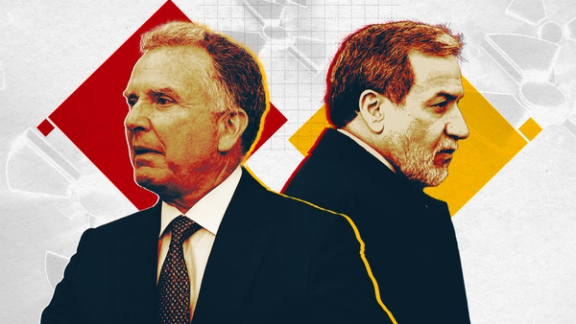
Iran will present a “reasonable, logical, and balanced” counter-proposal to the United States through Oman, Tehran’s foreign ministry said on Monday, urging the US to seize the opportunity to engage seriously with Tehran.
During his weekly press conference, Foreign Ministry spokesman Esmail Baghaei also reaffirmed Tehran’s right to uranium enrichment and warned of potential retaliatory steps if the West continues what it described as politicized pressure tactics.
“The American proposal does not reflect the outcomes of previous negotiations and cannot be considered a product of mutual understanding... It lacks the give-and-take required in a bilateral process,” Baghaei said.
“Any proposal that fails to consider the rights and interests of the Iranian nation—whether in peaceful nuclear energy including enrichment, or in providing effective guarantees for lifting cruel sanctions—is unacceptable to us ...
“We recommend that the American side seize this opportunity and review it seriously, as accepting it would benefit the United States.”
Earlier in the day, Tasnim news agency, affiliated with the Revolutionary Guards, reported that Iran is expected to deliver a formal written response to the US proposal within the next two days.
Warning over IAEA resolution
Addressing the possibility of a resolution against Iran at the IAEA Board of Governors meeting which started on Monday, Baghaei accused the agency of yielding to political pressure from the US and the three European countries known as the E3, the United Kingdom, France and Germany.
In March, the E3 issued a joint statement expressing concerns over Iran's nuclear activities, including unprecedented enrichment levels, advanced centrifuge deployment, lack of transparency and threats to non-proliferation.
“The Islamic Republic of Iran has always based its cooperation with the International Atomic Energy Agency on its commitments under the NPT and the Comprehensive Safeguards Agreement,” Baghaei said.
“Unfortunately, the Agency, under the influence of political pressure, drafted what it called a ‘comprehensive report,’ which European countries then exploited to push for a resolution.”
He warned that “a confrontational response will certainly not lead to more cooperation.” Iran, he added, has prepared a series of steps and measures and will act in coordination with the Atomic Energy Organization of Iran and relevant bodies.
“No country has the right to dictate terms to Iran regarding its enrichment rights or issue licenses in this regard,” Baghai said, affirming that uranium enrichment is “an inseparable part of Iran’s indigenous nuclear fuel cycle and scientific identity.”
Referring to Article 4 of the Non-Proliferation Treaty, he said, “This right is explicitly recognized for all signatory countries and is non-negotiable.”
The latest IAEA report, leaked to Western media late last month, concluded that Iran now possesses over 400 kg of 60%-enriched uranium—enough, if further enriched, to build approximately 10 nuclear weapons.
The report also cited ongoing Iranian non-cooperation on safeguards and expressed serious concern over the country’s continued enrichment at levels with no civilian justification.
No sanctions relief so far, Iran says
Baghaei dismissed recent reports that sanctions on Iran had been lifted. “As I said last week, the claim that sanctions have been halted is simply not true. In fact, a new set of sanctions was imposed just this week. This shows once again that the US is not serious.”
He criticized the “inconsistent and contradictory behavior of the United States, which simultaneously claims to seek dialogue while imposing fresh sanctions,” adding that such actions only increase Iran’s mistrust.
Iran’s nuclear posture
When asked about international concerns over a possible shift in Iran’s nuclear posture, Baghaei said that the country’s nuclear program is entirely peaceful.
“Even the IAEA’s latest report, despite its politically-motivated framing, does not mention any deviation from peaceful objectives,” he added.
No deal without sanctions relief
On whether Iran had addressed sanctions in the five previous rounds of talks, Baghaei said, “We have consistently emphasized the necessity of lifting oppressive sanctions in both the media and negotiations. How can an agreement be imagined without addressing this fundamental and legitimate demand?”
Sanctions since 2018 when US President Donald Trump pulled out of the JCPOA nuclear deal, have since crippled Iran's economy with inflation at record highs since the founding of the Islamic Republic.
“The main demand of the Iranian nation—besides preserving nuclear achievements—is the effective removal of sanctions. If a proposal ignores these two core principles, it not only lacks seriousness but is also unacceptable to us," he added.
Snapback mechanism and security council
Baghai also downplayed the likelihood of the so-called “snapback” mechanism being triggered at the UN Security Council as the October deadline draws closer and the threat of the reimposition of sanctions looming.
“There is no legal basis or justification for the continued presence of Iran’s nuclear issue on the Security Council’s agenda after October 2025. Any move to the contrary is purely political.”
He added that the US and its allies had previously taken Iran’s file to the Security Council in 2006 “without any such mechanism, using fabricated pretexts.”
Iran accuses Europe of abandoning diplomacy
Baghaei said while efforts have been underway by Tehran, diplomatic dialogue with Europe is failing: “European opposition cannot be a motivation for cooperation. While we engaged in dialogue and held several rounds of talks, unfortunately the European side neither offered constructive proposals nor remained committed to the diplomatic path.”
Referring to the IAEA resolution being prepared by European countries and supported by the US, he warned, “All of these parties will be responsible for the consequences. Sadly, this behavior reflects a continuing confrontational and uncooperative approach.”
Addressing Trump’s recent executive order restricting entry to citizens from 12 countries including Iran, Baghai said it was another move to drive a wedge between the two nations, amid the sensitive nuclear talks.
“The US decision is based on a discriminatory and racist outlook, and is entirely rejected from both human rights and moral perspectives," he said.
“For us Iranians, this action is yet another clear sign of the depth of hostility the American government harbors toward the Iranian people. It violates fundamental principles of equality and justice, and the international community must respond decisively.”